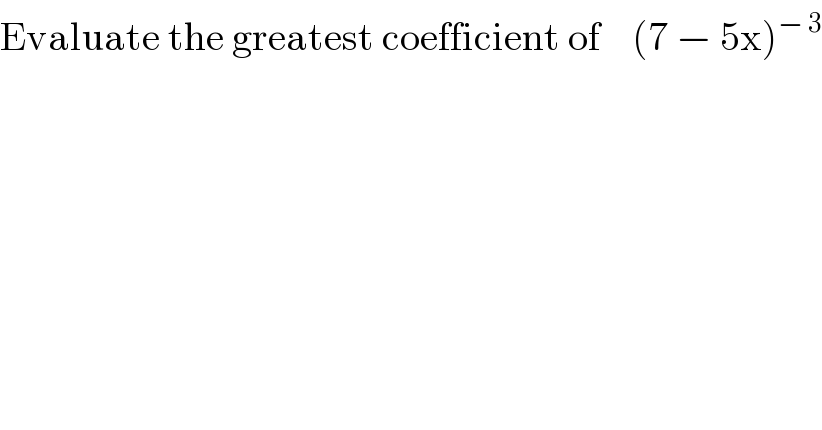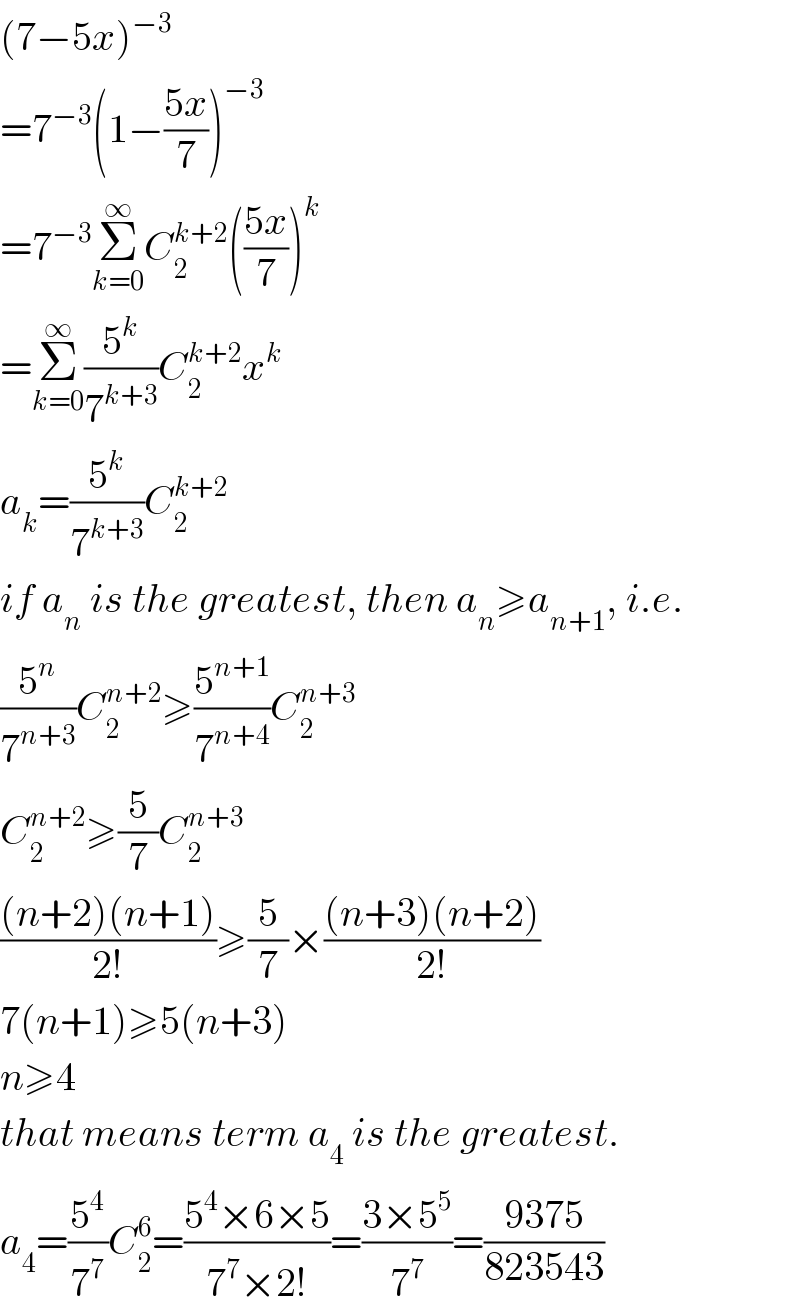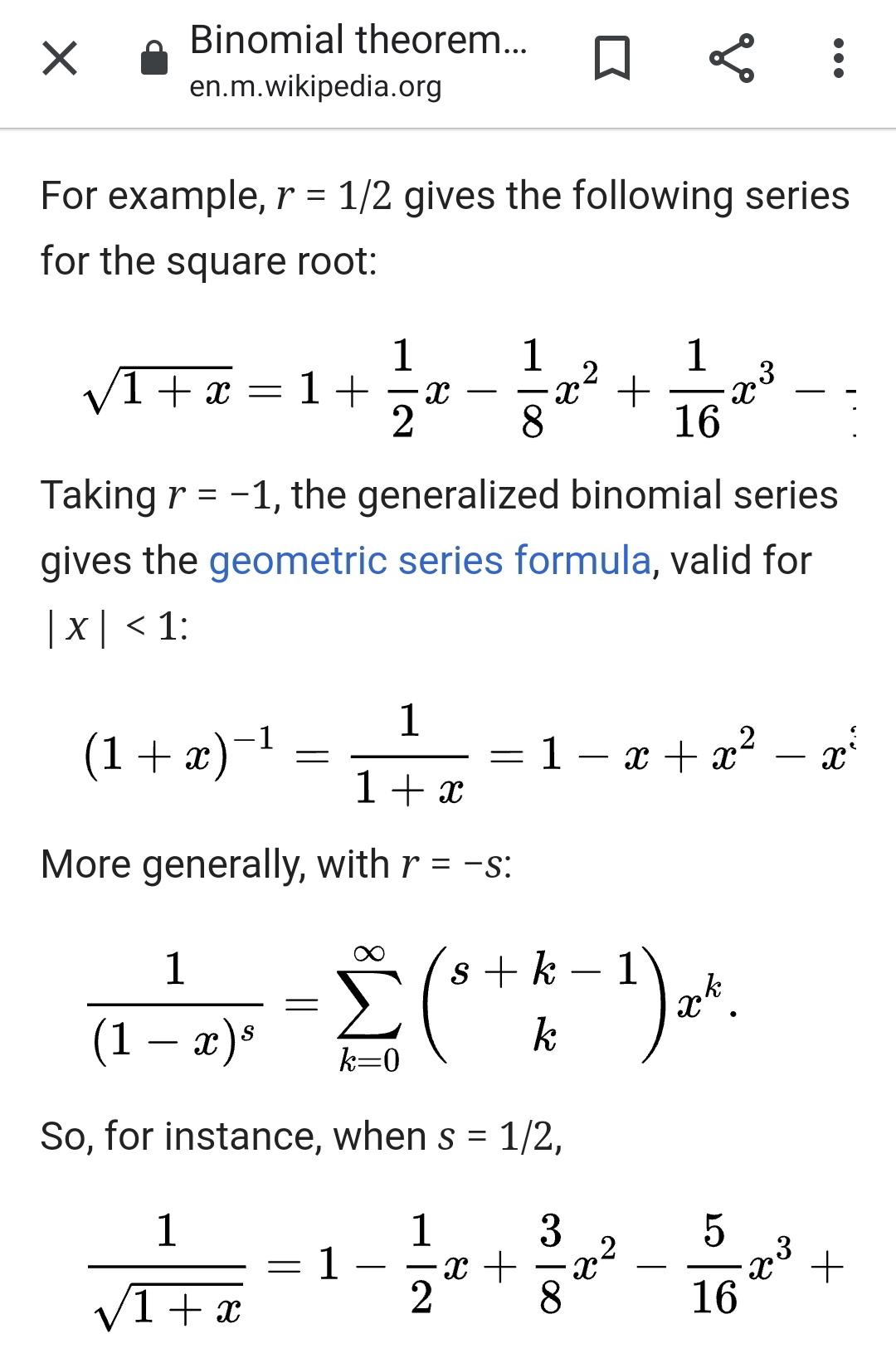Question Number 82149 by TawaTawa last updated on 18/Feb/20

$$\mathrm{Evaluate}\:\mathrm{the}\:\mathrm{greatest}\:\mathrm{coefficient}\:\mathrm{of}\:\:\:\:\left(\mathrm{7}\:−\:\mathrm{5x}\right)^{−\:\mathrm{3}} \\ $$
Commented by TawaTawa last updated on 18/Feb/20

$$\mathrm{Please}\:\mathrm{working}\:\mathrm{sir}.\:\mathrm{I}\:\mathrm{appreciate}. \\ $$
Answered by mr W last updated on 18/Feb/20

$$\left(\mathrm{7}−\mathrm{5}{x}\right)^{−\mathrm{3}} \\ $$$$=\mathrm{7}^{−\mathrm{3}} \left(\mathrm{1}−\frac{\mathrm{5}{x}}{\mathrm{7}}\right)^{−\mathrm{3}} \\ $$$$=\mathrm{7}^{−\mathrm{3}} \underset{{k}=\mathrm{0}} {\overset{\infty} {\sum}}{C}_{\mathrm{2}} ^{{k}+\mathrm{2}} \left(\frac{\mathrm{5}{x}}{\mathrm{7}}\right)^{{k}} \\ $$$$=\underset{{k}=\mathrm{0}} {\overset{\infty} {\sum}}\frac{\mathrm{5}^{{k}} }{\mathrm{7}^{{k}+\mathrm{3}} }{C}_{\mathrm{2}} ^{{k}+\mathrm{2}} {x}^{{k}} \\ $$$${a}_{{k}} =\frac{\mathrm{5}^{{k}} }{\mathrm{7}^{{k}+\mathrm{3}} }{C}_{\mathrm{2}} ^{{k}+\mathrm{2}} \\ $$$${if}\:{a}_{{n}} \:{is}\:{the}\:{greatest},\:{then}\:{a}_{{n}} \geqslant{a}_{{n}+\mathrm{1}} ,\:{i}.{e}. \\ $$$$\frac{\mathrm{5}^{{n}} }{\mathrm{7}^{{n}+\mathrm{3}} }{C}_{\mathrm{2}} ^{{n}+\mathrm{2}} \geqslant\frac{\mathrm{5}^{{n}+\mathrm{1}} }{\mathrm{7}^{{n}+\mathrm{4}} }{C}_{\mathrm{2}} ^{{n}+\mathrm{3}} \\ $$$${C}_{\mathrm{2}} ^{{n}+\mathrm{2}} \geqslant\frac{\mathrm{5}}{\mathrm{7}}{C}_{\mathrm{2}} ^{{n}+\mathrm{3}} \\ $$$$\frac{\left({n}+\mathrm{2}\right)\left({n}+\mathrm{1}\right)}{\mathrm{2}!}\geqslant\frac{\mathrm{5}}{\mathrm{7}}×\frac{\left({n}+\mathrm{3}\right)\left({n}+\mathrm{2}\right)}{\mathrm{2}!} \\ $$$$\mathrm{7}\left({n}+\mathrm{1}\right)\geqslant\mathrm{5}\left({n}+\mathrm{3}\right) \\ $$$${n}\geqslant\mathrm{4} \\ $$$${that}\:{means}\:{term}\:{a}_{\mathrm{4}} \:{is}\:{the}\:{greatest}. \\ $$$${a}_{\mathrm{4}} =\frac{\mathrm{5}^{\mathrm{4}} }{\mathrm{7}^{\mathrm{7}} }{C}_{\mathrm{2}} ^{\mathrm{6}} =\frac{\mathrm{5}^{\mathrm{4}} ×\mathrm{6}×\mathrm{5}}{\mathrm{7}^{\mathrm{7}} ×\mathrm{2}!}=\frac{\mathrm{3}×\mathrm{5}^{\mathrm{5}} }{\mathrm{7}^{\mathrm{7}} }=\frac{\mathrm{9375}}{\mathrm{823543}} \\ $$
Commented by TawaTawa last updated on 18/Feb/20

$$\mathrm{God}\:\mathrm{bless}\:\mathrm{you}\:\mathrm{sir}. \\ $$
Commented by mr W last updated on 19/Feb/20

$${is}\:{my}\:{working}\:{clear}\:{and}\:{understood}? \\ $$
Commented by TawaTawa last updated on 19/Feb/20

$$\mathrm{It}\:\mathrm{is}\:\mathrm{only}\:\mathrm{the}\:\mathrm{third}\:\mathrm{line}\:\mathrm{am}\:\mathrm{finding}\:\mathrm{difficult}\:\mathrm{to}\:\mathrm{understand}\:\mathrm{sir} \\ $$
Commented by TawaTawa last updated on 19/Feb/20

$$\mathrm{How}\:\mathrm{to}\:\mathrm{get}\:\mathrm{the}\:\mathrm{combination} \\ $$
Commented by mr W last updated on 19/Feb/20

$${you}\:{must}\:{have}\:{learnt}\:\left({a}+{b}\right)^{{n}} .\:{if}\:{not}, \\ $$$${try}\:{to}\:{study}\:{about}\:“{binomial}\:{theorem}''. \\ $$$${we}\:{have}\:{here}\:{a}=\mathrm{1},\:{b}=−\frac{\mathrm{5}{x}}{\mathrm{7}}\:{and}\:{n}=−\mathrm{3}. \\ $$
Commented by TawaTawa last updated on 19/Feb/20

$$\mathrm{Yes}\:\mathrm{sir}.\:\mathrm{I}\:\mathrm{know}\:\:\left(\mathrm{a}\:+\:\mathrm{b}\right)^{\mathrm{n}} \\ $$$$\mathrm{How}\:\mathrm{can}\:\mathrm{i}\:\mathrm{get}:\:\:\:\:\:\overset{\mathrm{k}\:+\:\mathrm{2}} {\:}\mathrm{C}_{\mathrm{2}} \left(\frac{\mathrm{5x}}{\mathrm{7}}\right)^{\mathrm{k}} \\ $$$$\mathrm{Thanks}\:\mathrm{for}\:\mathrm{your}\:\mathrm{help}\:\mathrm{sir} \\ $$
Commented by mr W last updated on 19/Feb/20

Commented by TawaTawa last updated on 19/Feb/20

$$\mathrm{God}\:\mathrm{bless}\:\mathrm{you}\:\mathrm{sir}.\:\mathrm{I}\:\mathrm{understand}\:\mathrm{now}.\:\mathrm{Thanks}\:\mathrm{for}\:\mathrm{your}\:\mathrm{time}. \\ $$
